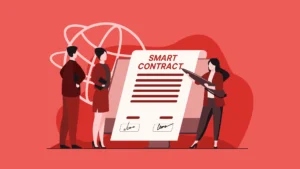
Self-Executing Contracts, also known as smart contracts, are reshaping the landscape of Web3 Technologies by offering a novel approach to managing and executing agreements. Unlike traditional contracts that rely on intermediaries and manual enforcement, self-executing contracts operate automatically based on code deployed on a blockchain. This transformative technology promises to enhance efficiency, transparency, and automation across various industries, fundamentally altering how digital agreements are managed. fundamentally altering how digital agreements are managed. The evolution of Smart Contract Development is crucial for automating the swap process. Smart Contracts is at the forefront of this change, enabling more sophisticated and secure digital interactions.
What Are Self-Executing Contracts?
Self-executing contracts are essentially pieces of code programmed to perform specific actions once certain conditions are met. These contracts are written and stored on a blockchain, a decentralized ledger that ensures the integrity and immutability of the contract. Unlike traditional agreements that require external enforcement, smart contracts automatically execute, manage, and verify contract terms without human intervention. This automation reduces the risk of errors and fraud, offering a more secure and efficient way to handle transactions. By leveraging the inherent features of blockchain technology, such as decentralization and immutability, Self-Executing Contracts provide a transparent and reliable mechanism for managing agreements.
-
Definition and Core Features
At its core, a self-executing contract is a digital agreement written in code and deployed on a blockchain. These contracts are designed to execute automatically when predefined conditions are satisfied, eliminating the need for intermediaries. The key features of smart contracts include automation, which allows them to perform actions without human intervention, transparency, where all transactions are recorded on an immutable ledger for verification, and immutability, ensuring that once deployed, the contract code cannot be altered. These features collectively enhance the efficiency, security, and trustworthiness of contractual agreements, setting smart contracts apart from traditional methods.
-
Comparison with Traditional Contracts
Traditional contracts often involve multiple intermediaries such as lawyers, notaries, and banks to ensure compliance and enforce terms. This reliance on intermediaries can introduce delays, additional costs, and the potential for errors. In contrast, self-executing contracts streamline this process by automating enforcement through code. This not only reduces the need for intermediaries but also accelerates the execution of contractual terms. For example, in financial transactions, smart contracts can automatically execute trades and settlements based on pre-set criteria, significantly speeding up the process and reducing administrative overhead. This shift to automation and direct execution represents a significant improvement over traditional methods, offering a more efficient and reliable approach to managing agreements.
Benefits of Self-Executing Contracts in Web3
The integration of self-executing contracts into Web3 Technologies offers a range of benefits that are driving their adoption across various industries. One of the primary advantages is enhanced efficiency and automation. By automating complex processes and eliminating manual oversight, smart contracts streamline workflows, reduce errors, and accelerate transactions. In the financial sector, for instance, smart contracts facilitate lending, borrowing, and trading activities with greater speed and accuracy, leading to improved liquidity and market efficiency.
In addition to efficiency, self-executing contracts provide increased transparency and trust. Since all transactions are recorded on a blockchain, participants can access a transparent and immutable record of actions and contract terms. This level of transparency helps reduce the risk of fraud and ensures that all parties have access to the same information. For example, in supply chain management, smart contracts offer real-time visibility into the movement of goods, fostering trust among participants and enhancing the reliability of the supply chain.
Cost reduction is another significant benefit of Self-Executing Contracts . By eliminating intermediaries and automating execution, smart contracts reduce administrative costs and streamline processes. Traditional contract management often involves various fees and tasks, such as legal consultations and documentation. Smart contracts minimize these costs by automating enforcement and reducing the need for manual intervention. This cost-effective approach is particularly advantageous for startups and small businesses looking to optimize their operations and improve financial efficiency.
Applications of Self-Executing Contracts in Web3 Industries
Self-executing contracts have a wide range of applications in the Web3 ecosystem, showcasing their versatility and transformative potential across different sectors.
In the realm of Decentralized Finance (DeFi), smart contracts are pivotal in automating processes such as lending, borrowing, and trading. They enable decentralized exchanges and Automated Market Makers (AMMs) to facilitate trades without the need for centralized intermediaries. This automation enhances liquidity and market efficiency, providing users with a seamless and efficient trading experience. By leveraging smart contracts, DeFi platforms can offer innovative financial products and services while reducing reliance on traditional financial institutions.
Supply Chain Management Supply chain management is another area where self-executing contracts are making a significant impact. By automating the tracking and verification of goods, smart contracts ensure compliance with agreements and provide a transparent record of transactions. This capability helps reduce the risk of fraud and enhances the overall efficiency of the supply chain. Companies such as IBM and Maersk are leveraging blockchain-based smart contracts to improve their supply chain operations, demonstrating the practical benefits of this technology in real-world scenarios.
In the realm of digital identity and privacy, self-executing contracts offer a secure and efficient method for managing personal data and digital interactions. By controlling access and permissions based on predefined rules, smart contracts enable individuals to maintain greater control over their personal information. For instance, decentralized identity systems use smart contracts to verify and manage user identities, enhancing privacy and reducing the risk of identity theft and fraud. This approach provides a more secure and user-centric method for handling digital identities.
Challenges and Considerations
Despite their numerous benefits, self-executing contracts face several challenges and considerations that must be addressed to facilitate their widespread adoption.
Security risks are a significant concern for smart contracts. While Blockchain Technology provides enhanced security, vulnerabilities in contract code can lead to potential exploits and financial losses. The infamous DAO hack of 2016 highlighted the risks associated with coding errors in smart contracts. To mitigate these risks, it is essential to conduct thorough code audits and implement robust security measures. Ensuring the security of smart contracts is crucial for maintaining trust and protecting against potential breaches.
Legal and regulatory issues also pose challenges for self-executing contracts. The legal status of smart contracts varies across jurisdictions, which can impact their integration into existing legal frameworks. Some jurisdictions may require specific legal provisions for smart contracts to be recognized as legally binding, while others may impose additional regulatory requirements. Navigating these legal complexities is essential for ensuring compliance and facilitating the adoption of smart contracts in different regions.
Scalability is another concern for self-executing contracts, particularly as Blockchain Networks expand. High transaction volumes can lead to network congestion and increased processing times, affecting the performance of smart contracts. Solutions such as layer-2 scaling protocols and Blockchain Interoperability are being developed to address these scalability issues and improve the efficiency of smart contract platforms. Overcoming these challenges is crucial for supporting the growing demand for smart contracts and ensuring their continued effectiveness.
Future Trends and Innovations
The future of self-executing contracts is bright, with ongoing developments and innovations poised to enhance their capabilities and applications.
Integrating self-executing contracts with Artificial Intelligence (AI) and the Internet of Things (IoT) offers exciting possibilities for enhancing automation and decision-making. AI can enable more sophisticated contract executions by analyzing data and adapting to changing conditions, while IoT devices can provide real-time data to trigger contract actions. For example, smart contracts integrated with IoT sensors can automate supply chain processes based on real-time inventory levels and environmental conditions. This integration has the potential to revolutionize various industries by enabling more dynamic and responsive systems.
Advancements in blockchain platforms are continuously improving the functionality and scalability of smart contracts. New programming languages, development tools, and consensus mechanisms are being introduced to support more complex and efficient contract executions. Platforms like Ethereum 2.0 are implementing improvements such as sharding and proof-of-stake to enhance scalability and performance. These advancements are crucial for supporting the growing demand for smart contracts and expanding their applications across different sectors.
Emerging use cases for self-executing contracts are driving innovation and presenting new opportunities across various industries. From decentralized governance models to innovative financial products, smart contracts are enabling the development of new business models and applications. For instance, Decentralized Autonomous Organizations (DAOs) leverage smart contracts to facilitate decentralized decision-making and governance, creating new possibilities for community-driven initiatives. Exploring these emerging use cases presents exciting opportunities for growth and development in the Web3 ecosystem.
Why Choose Nadcab Labs for Your Web3 Projects?
When it comes to developing self-executing contracts and leveraging Web3 technologies, Nadcab Labs is an ideal partner for your development needs. Our expertise and commitment to delivering high-quality solutions make us a top choice for your Web3 Projects.
At Nadcab Labs , we offer extensive experience in creating and deploying smart contracts tailored to specific requirements. Our team of experts ensures precision and reliability in every project, leveraging our deep understanding of blockchain technology. We have successfully delivered smart contract solutions across various industries, demonstrating.






